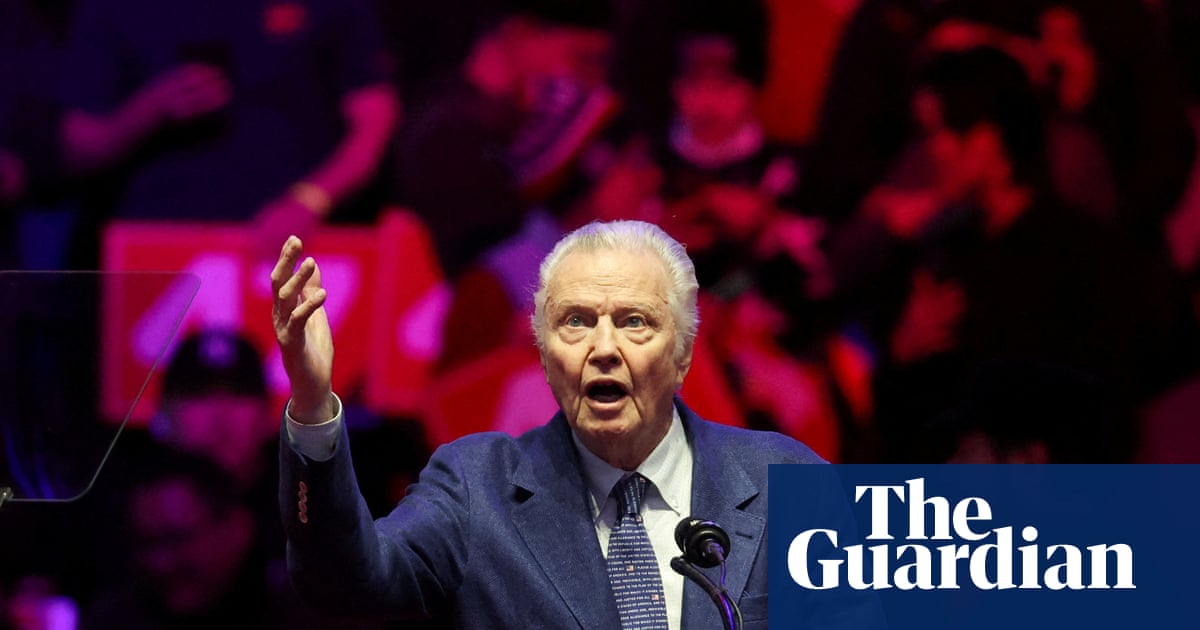US president Donald Trump announced his 100% tariff on films“coming into our country produced in foreign lands”one day after meeting with actor Jon Voight to discuss his proposals to bring film production back to the US – which only suggested that tariffs could be used “in certain limited circumstances”.
The Midnight Cowboy and Heat actor, who was appointed a “special ambassador” to Hollywood by Trump, has been meeting with studios, streamers, unions and guilds for months to develop a plan to lure film and television productions back to the US. Production companies often seek more cost-effective locations or tax incentives in other countries such as Canada, Australia, the UK, New Zealand, Hungary, Italy and Spain.
On the weekend Voight and his manager and film producer Steven Paul met with Trump at Mar-A-Lago to deliver his “comprehensive plan” – just before Trump stunned the international film industry with the idea of a 100% tariff on all films “coming into our country produced in foreign lands”.
Only the topline details of Voight’s proposal were revealed on Monday, but the only mention of tariffs in the plan was that they could be used “in certain limited circumstances” – in contrast with Trump’s sweeping announcement. His main proposals involve federal tax incentives, changes to tax codes, co-production treaties with other countries, and infrastructure subsidies for theater owners, and production and post-production companies.
Hollywood productions are often filmed in countries such as Canada, Australia, the UK, New Zealand, Hungary, Italy and Spain in order to take advantage of local tax incentives, talent pools and landscapes that look geographically similar enough to stand in for more expensive US locations.
In a statement on Monday Voight said the White House was now “reviewing” his proposals.
“The President loves the entertainment business and this country, and he will help us make Hollywood great again,” Voight said. “We look forward to working with the administration, the unions, studios, and streamers to help form a plan to keep our industry healthy and bring more productions back to America.”
The White House walked back on Trump’s announcement afterwards, saying that “no final decisions on foreign film tariffs have been made”.
Film production in Los Angeles has declined almost 40% over the last decade, according to FilmLA, but not all this business went overseas: other states such as New York and Georgia have long offered generous tax incentives to attract productions.
Reactions in Hollywood to Trump’s announcement have been varied, in the absence of detail; it remains unclear how it would be decided which films would qualify as “foreign”. Marvel’s new film Thunderbolts*, for instance, was mostly made in the US but included some shoots on location in Malaysia and a score recorded in London. The tariff would also not address the comparatively higher cost of shooting in the US.
US performers union Sag-Aftra seemed broadly positive, saying it “supports efforts to increase movie, television and streaming production in the US” and that it would “advocate for policies that strengthen our competitive position, accelerate economic growth and create good middle class jobs for American workers”.
The International Alliance of Theatrical Stage Employees (IATSE) called for a “balanced federal response”, with IATSE’s international president Matthew Loeb saying the crew union had “recommended that the Trump administration implement a federal film production tax incentive and other domestic tax provisions to level the playing field for American workers”.
IATSE, however, also represents workers in Canada, with Loeb saying it would “continue to stand firm in our conviction that any eventual trade policy must do no harm to our Canadian members – nor the industry overall.”
Australia has reacted with trepidation: the countryhas attracted US tent pole productions via various rebates, including the federal government’s 30% rebate for big-budget film projects shot in Australia. Just under half of the A$1.7bn spent on screen production in Australia during 2023-24 was on international productions.
Australia’s arts minster, Tony Burke, said he was monitoring the situation closely.
“Nobody should be under any doubt that we will be standing up unequivocally for the rights of the Australian screen industry,” Burke said.
Voight, Mel Gibson and Sylvester Stallone were appointed by Trump to be “special ambassadors to Hollywood”, which the president has called a “great but very troubled place”.
